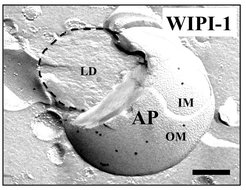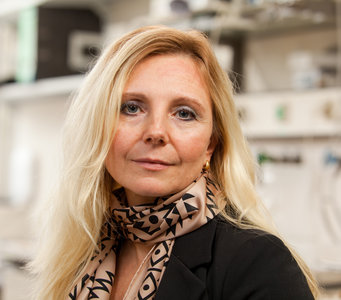Tassula Proikas-Cezanne
Human WIPI β-propellers in autophagy, health and disease
University of Tübingen
Faculty in: IMPRS

Vita
- PhD (Dr. rer. nat.) 1995 from the University of Hamburg (external thesis at the MPI for Plant Breeding, Cologne)
- Postdoctoral scientist at the Marie Curie Research Institute, Oxted, UK and Temple University, Philadelphia, USA
- Scientific consultant at Onconova Therapeutics, Princeton, NJ, USA
- Since 2004 group leader at the Interfaculty Institute for Cell Biology, University of Tübingen
- Since 2012 apl. Professor for Molecular Biology and Cell Biology at the Faculty of Science, Eberhard Karls University Tübingen
Research Interest
Earlier, we discovered the four human WIPI beta-propellers, WIPI1 through WIPI4, which belong to the ancient PROPPIN family and fulfill important functions in autophagy. In this context, WIPI beta-propellers function as PI3P (phosphatidylinositol 3-phosphate) effectors during autophagosome formation, as scaffolds for energy- and nutrient-dependent signal control of autophagy, and are part of a new mechanism driving autophagic membranes through tunneling nanotubes (TNTs) across cell boundaries. Loss of WIPI function negatively impacts autophagy and contributes to neurodegeneration. In this context, mutations in WDR45, the human gene encoding WIPI4, are of particular interest because sporadic WDR45 mutations are the cause of a rare human neurodegenerative disease called BPAN (beta-propeller protein-associated neurodegeneration), which is hallmarked by high iron accumulation in the brain. In addition, mutations in the other WIPI members also contribute to neurodegenerative diseases, but molecular connections between lack of WIPI function, autophagy and neurodegeneration are unknown. We would therefore like to contribute to this understanding with our work and thus also help to detail the role of autophagy in human health and disease.

Taken from: Proikas-Cezanne T & Robenek H (2011). Freeze-fracture replica immunolabelling reveals human WIPI-1 and WIPI-2 as membrane proteins of autophagosomes. J Cell Mol Med. 15(9): 2007-2010.
Available PhD Projects
- Currently not recruiting PhD students via the IMPRS via the IMPRS
Selected Reading
- Sporbeck K, Haas ML, Pastor-Maldonado CJ, Schüssele DS, Hunter C, Takacs Z, Diogo de Oliveira AL, Franz-Wachtel M, Charsou C, Pfisterer SG, Gubas A, Haller PK, Knorr RL, Kaulich M, Macek B, Eskelinen EL, Simonsen A, Proikas-Cezanne T. The ABL-MYC axis controls WIPI1-enhanced autophagy in lifespan extension. Commun Biol. 2023 Aug 24;6(1):872. doi: 10.1038/s42003-023-05236-9. PMID: 37620393; PMCID: PMC10449903.
- Bakula D, Müller AJ, Zuleger T, Takacs Z, Franz-Wachtel M, Thost AK, Brigger D, Tschan MP, Frickey T, Robenek H, Macek B, Proikas-Cezanne T. WIPI3 and WIPI4 β-propellers are scaffolds for LKB1-AMPK-TSC signalling circuits in the control of autophagy. Nat Commun. 2017 May 31;8:15637. doi: 10.1038/ncomms15637. PMID: 28561066; PMCID: PMC5460038
- Proikas-Cezanne T, Takacs Z, Dönnes P, Kohlbacher O. WIPI proteins: essential PtdIns3P effectors at the nascent autophagosome. J Cell Sci. 2015 Jan 15;128(2):207-17. doi: 10.1242/jcs.146258. PMID: 25568150.
- Proikas-Cezanne T, Waddell S, Gaugel A, Frickey T, Lupas A, Nordheim A. WIPI-1alpha (WIPI49), a member of the novel 7-bladed WIPI protein family, is aberrantly expressed in human cancer and is linked to starvation-induced autophagy. Oncogene. 2004 Dec 16;23(58):9314-25. doi: 10.1038/sj.onc.1208331. PMID: 15602573.

